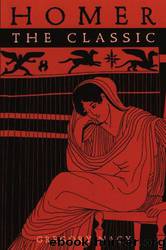Homer the Classic by Gregory Nagy

Author:Gregory Nagy [Nagy, Gregory]
Language: eng
Format: epub
Tags: Oral Tradition, History and Criticism, Epic Poetry; Greek - History and Criticism, Poetry, General, Literary, Literary Criticism, Homer - Criticism and Interpretation, Greece, Biography & Autobiography, Ancient & Classical, Oral Tradition - Greece, Epic Poetry; Greek
ISBN: 9780674033269
Google: oCVSAQAAIAAJ
Amazon: 0674033264
Publisher: Center for Hellenic Studies
Published: 2009-01-02T05:00:00+00:00
2ⓢ25. The sorrows of Andromache
2§334 As we have seen so far, the sequencing of the narrative in the third performance by Demodokos is the consequence of a perfectly executed humnos. The effects of this perfect execution are demonstrated by the reaction of the audience of Demodokos – in particular, by the tears of Odysseus. As we have also seen, what transforms the third performance into something Cyclic is the correspondence of its story with the story of the Iliou Persis. Now, what will transform this same performance into something Homeric is its application to the plot as it is taking shape in the master narrative. The result, which I analyze in the twin book Homer the Preclassic, is an actual competition of Homeric form with Cyclic form. [301] In the present book, on the other hand, I analyze the interweaving between the epic of Homer and the epic of Demodokos. And the thread of thought for this interweaving is the story of the sorrows of Andromache.
2§335 Relevant is the fact that the totality of narration in the third performance of Demodokos is achieved not directly but indirectly. It is achieved by way of the outer narrative that frames the third song. In the outer narrative, the reaction of Odysseus to the inner narrative fills out that inner narrative. At the precise moment when Odysseus starts to weep in response to the narration of Demodokos, the weeping of this hero as the foremost participant {343|344} in the audience is compared by way of a simile to the weeping of an unidentified woman who has just been captured by the enemy. The simile takes up the narration at exactly the point where it was left off by the narrative of Demodokos – and by the outer narrative of the Odyssey. That point in the epic Cycle, as we just saw in the Proclus summary of the Iliou Persis (p. 108.8-10), is the moment when Odysseus is about to kill Astynanax, son of Andromache and Hector, and Neoptolemos is about to capture Andromache herself as his prize. [302]
2§336 This moment in the Cycle is foreshadowed in the Iliad. I quote here the most telling verses, where Hector reveals to Andromache his forebodings about his own death and about its dire consequences for his wife and child:
2ⓣ96 Iliad VI 448-464
εὖ γὰρ ἐγὼ τόδε οἶδα κατὰ φρένα καὶ κατὰ θυμόν·
ἔσσεται ἦμαρ ὅτ’ ἄν ποτ’ ὀλώλῃ Ἴλιος ἱρὴ
450καὶ Πρίαμος καὶ λαὸς ἐϋμμελίω Πριάμοιο.
ἀλλ’ οὔ μοι Τρώων τόσσον μέλει ἄλγος ὀπίσσω,
οὔτ’ αὐτῆς Ἑκάβης οὔτε Πριάμοιο ἄνακτος
οὔτε κασιγνήτων, οἵ κεν πολέες τε καὶ ἐσθλοὶ
ἐν κονίῃσι πέσοιεν ὑπ’ ἀνδράσι δυσμενέεσσιν,
ὅσσον σεῦ, ὅτε κέν τις Ἀχαιῶν χαλκοχιτώνων
455 δακρυόεσσαν ἄγηται ἐλεύθερον ἦμαρ ἀπούρας·
καί κεν ἐν Ἄργει ἐοῦσα πρὸς ἄλλης ἱστὸν ὑφαίνοις,
καί κεν ὕδωρ φορέοις Μεσσηΐδος ἢ Ὑπερείης
πόλλ’ ἀεκαζομένη, κρατερὴ δ’ ἐπικείσετ’ ἀνάγκη·
καί ποτέ τις εἴπῃσιν ἰδὼν κατὰ δάκρυ χέουσαν·
460 Ἕκτορος ἥδε γυνὴ ὃς ἀριστεύεσκε μάχεσθαι
Τρώων ἱπποδάμων ὅτε Ἴλιον ἀμφεμάχοντο.
ὥς ποτέ τις ἐρέει· σοὶ δ’ αὖ νέον ἔσσεται ἄλγος
χήτεϊ τοιοῦδ’ ἀνδρὸς ἀμύνειν δούλιον ἦμαρ.
ἀλλά με τεθνηῶτα χυτὴ κατὰ γαῖα καλύπτοι {344|345}
For I
Download
This site does not store any files on its server. We only index and link to content provided by other sites. Please contact the content providers to delete copyright contents if any and email us, we'll remove relevant links or contents immediately.
4 3 2 1: A Novel by Paul Auster(12360)
The handmaid's tale by Margaret Atwood(7744)
Giovanni's Room by James Baldwin(7313)
Asking the Right Questions: A Guide to Critical Thinking by M. Neil Browne & Stuart M. Keeley(5747)
Big Magic: Creative Living Beyond Fear by Elizabeth Gilbert(5735)
Ego Is the Enemy by Ryan Holiday(5404)
The Body: A Guide for Occupants by Bill Bryson(5067)
On Writing A Memoir of the Craft by Stephen King(4924)
Ken Follett - World without end by Ken Follett(4712)
Adulting by Kelly Williams Brown(4558)
Bluets by Maggie Nelson(4541)
Eat That Frog! by Brian Tracy(4508)
Guilty Pleasures by Laurell K Hamilton(4431)
The Poetry of Pablo Neruda by Pablo Neruda(4084)
Alive: The Story of the Andes Survivors by Piers Paul Read(4013)
White Noise - A Novel by Don DeLillo(3998)
Fingerprints of the Gods by Graham Hancock(3982)
The Book of Joy by Dalai Lama(3965)
The Bookshop by Penelope Fitzgerald(3838)
